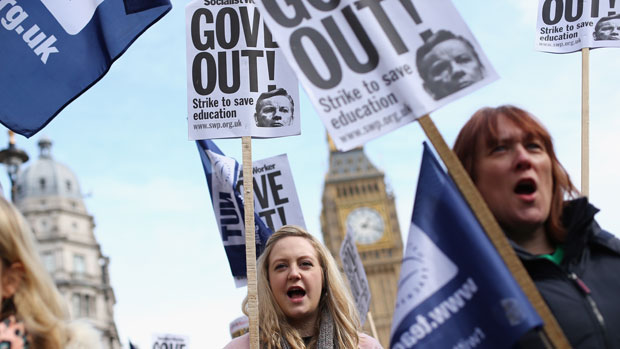Public sector strike briefing: a million workers walk out
Strike action expected to be largest in three years, but Cameron plans to impose tough new strike laws

A free daily email with the biggest news stories of the day – and the best features from TheWeek.com
You are now subscribed
Your newsletter sign-up was successful
Hundreds of schools and fire stations across the UK are closed today as teachers and other public sector workers stage a mass walkout over pay and spending cuts. David Cameron has criticised the action, but in private he may welcome it as a chance to garner support for new legislation tightening the rules on strikes.
Who's on strike?
Over a million public sector workers are taking action. Some unions say they expect up to two million workers could take part in the action, making it the largest walk-out since the pension dispute in 2011.
The Week
Escape your echo chamber. Get the facts behind the news, plus analysis from multiple perspectives.

Sign up for The Week's Free Newsletters
From our morning news briefing to a weekly Good News Newsletter, get the best of The Week delivered directly to your inbox.
From our morning news briefing to a weekly Good News Newsletter, get the best of The Week delivered directly to your inbox.
Workers taking part in the action include fire fighters, civil servants, teachers, transport workers and local government employees across the UK.
Why are they striking?
Unions have organised the walk-out in protest against pay freezes, pensions, job losses and spending cuts across the public sector.
"Workers are on strike today to say enough is enough" said TUC general secretary Frances O'Grady. "Year after year pay has failed to keep up with the cost of living."
A free daily email with the biggest news stories of the day – and the best features from TheWeek.com
The government froze public sector pay four years ago and a pay-rise cap of one per cent was introduced in 2012.
Public sector employees are £2,245 worse off under the coalition government and half a million council workers earn below the living wage, according to a recent TUC report.
How has the government reacted?
"The vast majority of dedicated public sector workers did not vote for today's action," a Cabinet Office spokesman told the BBC.
However, the BBC's chief political correspondent Norman Smith said the action is "actually rather politically convenient." He says it may help to bolster support for David Cameron's plans to include a strike ballot threshold in the Conservative's next manifesto.
"How can it possibly be right for our children's education to be disrupted by trade unions acting in that way?" Cameron said during prime minister's questions yesterday. "It is time to legislate."
Labour and the unions have criticised the proposal, which would require at least 50 per cent of a union's membership to turn out in order for a strike ballot to be binding.
In response to Cameron's statement, O'Grady said: "A better use of the prime minister's time might be to come up with ways to ensure that Britain's hard-pressed public sector workers begin to share in the economic recovery."
What is Labour's position?
Labour is anxious to avoid being seen allying itself to the unions and has tried to direct pressure back onto the coalition. "No-one wants to see a strike, not least because of the impact on children and parents," a party spokesman said. "Instead of ramping up the rhetoric the government should get round the table, because both sides have a responsibility to stop it happening."
-
 How the FCC’s ‘equal time’ rule works
How the FCC’s ‘equal time’ rule worksIn the Spotlight The law is at the heart of the Colbert-CBS conflict
-
 What is the endgame in the DHS shutdown?
What is the endgame in the DHS shutdown?Today’s Big Question Democrats want to rein in ICE’s immigration crackdown
-
 ‘Poor time management isn’t just an inconvenience’
‘Poor time management isn’t just an inconvenience’Instant Opinion Opinion, comment and editorials of the day
-
 How corrupt is the UK?
How corrupt is the UK?The Explainer Decline in standards ‘risks becoming a defining feature of our political culture’ as Britain falls to lowest ever score on global index
-
 The high street: Britain’s next political battleground?
The high street: Britain’s next political battleground?In the Spotlight Mass closure of shops and influx of organised crime are fuelling voter anger, and offer an opening for Reform UK
-
 Is a Reform-Tory pact becoming more likely?
Is a Reform-Tory pact becoming more likely?Today’s Big Question Nigel Farage’s party is ahead in the polls but still falls well short of a Commons majority, while Conservatives are still losing MPs to Reform
-
 Taking the low road: why the SNP is still standing strong
Taking the low road: why the SNP is still standing strongTalking Point Party is on track for a fifth consecutive victory in May’s Holyrood election, despite controversies and plummeting support
-
 What difference will the 'historic' UK-Germany treaty make?
What difference will the 'historic' UK-Germany treaty make?Today's Big Question Europe's two biggest economies sign first treaty since WWII, underscoring 'triangle alliance' with France amid growing Russian threat and US distance
-
 Is the G7 still relevant?
Is the G7 still relevant?Talking Point Donald Trump's early departure cast a shadow over this week's meeting of the world's major democracies
-
 Angela Rayner: Labour's next leader?
Angela Rayner: Labour's next leader?Today's Big Question A leaked memo has sparked speculation that the deputy PM is positioning herself as the left-of-centre alternative to Keir Starmer
-
 Is Starmer's plan to send migrants overseas Rwanda 2.0?
Is Starmer's plan to send migrants overseas Rwanda 2.0?Today's Big Question Failed asylum seekers could be removed to Balkan nations under new government plans